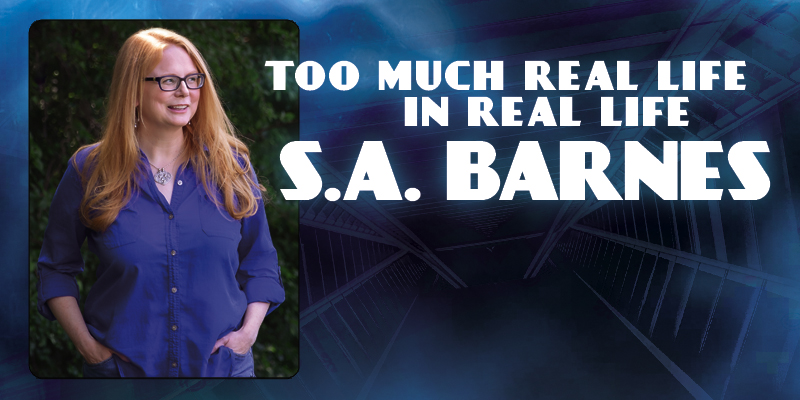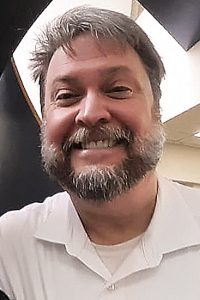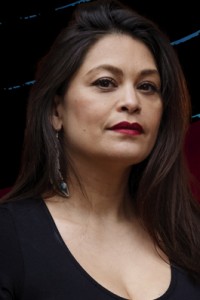S.A. Barnes: Too Much Real Life in Real Life

STACEY ANN BARNES was born in 1975 in Champaign-Urbana IL. She has worked as a copywriter and a high school librarian.
She writes YA, romance, and mystery as Stacey Kade, with works of genre interest under that name including The Rules (2013), The Hunt (2014), and The Trials (2015) in the Project Paper Doll series, and The Ghost and the Goth (2010) and sequels Queen of the Dead (2011) and Body & Soul (2012). As Stacey Klemstein, she wrote The Silver Spoon (2004) and sequel Eye of the Beholder (2008).
Her first book as S.A. Barnes was space horror Dead Silence (2022), followed by standalone Ghost Station (2024). Her latest SF horror novel is Cold Eternity (2025). Romantasy Death’s Daughter is expected in 2026, and launches a new series.
Barnes lives north of Chicago with her family.
Excerpt from the interview:

“Cold Eternity is so much fun. I’ve always been interested in space – specifically, in the future. I’m not one of those people that would go up to the space station, but I like the idea of a future where I can stay in a hotel that’s based in space. I love the potential of humanity that shows, that we might finally get our heads out of our you-know-whats and progress as a society. But also, we’re still human beings, and we’re still going to bring our flaws with us into the future.
“To use aliens, as an example: We’re going to colonize, and we’re going to send help when the colonists get in trouble, but we’re also going to be greedy and try to steal the alien tech and try to replicate it for warfare. I like both the hope that presents for the future of humanity, and also the familiarity of how we’ll screw ourselves over by being us. It’s those two things together that I find most intriguing, and I fully admit that while I hope the horror side of it is certainly scary and gross, I also hope that people recognize that we’re complicit in that horror. There’s a human that’s complicit in the evil that we’re experiencing. I don’t write about just some giant creature that’s going to kill you. It’s because we went poking around where we shouldn’t have, or we did something that woke the creature up and made it angry, and now we have to deal with that. It’s both about the flaws of humanity and the hope for the potential I think we have.
“I draw inspiration from all over the place. Aliens, the second movie, is specifically an inspiration. I was deliberately thinking of that at the beginning of Cold Eternity, where the protagonist is meeting with the corporation, and they’re telling her it couldn’t be the way that she’s describing, and she’s like, ‘No, listen to me!’ Aliens was also very much an influence on Dead Silence when they’re coming to talk to her in the mental facility. Ellen Ripley is just an iconic character, and I feel that, while things are changing in science fiction, the role that women play – both as creators and as characters – has not always been what we want it to be. Ellen Ripley stands alone, because there aren’t many women in sci-fi who are not cannon fodder or a love interest. There’s nothing wrong with love interest, I love a love interest, but I want the character to be somebody beyond just a love interest. That movie was influential to me because you have someone who is this main character who is still being looked at like, ‘Well, we’re not sure if we should believe you – maybe you’re just a hysterical woman.’ I really want more female perspectives out there – in sci-fi, in horror, in both together – because the genre is not as representative as we would like to be. That goes for any and all voices that are not the traditional voice. I feel like we need more of those, because we’re missing out.
“Oh my gosh, I love horror. The funniest thing about it is, I’m the biggest chicken. I watch movies with my hands in front of my face, or I turn the music down because I’ve found if the music isn’t playing the creepy violins, it’s way less scary, and I can make it through. Horror is so weird for me. It is just the glee of writing something and thinking, ‘Somebody is going to be so grossed out by this,’ or, ‘Somebody is going to be so freaked out that something under the skin is moving around.’ It’s also about drawing on your own fears in a way, and being able to express them and control them. I’m sure a psychologist would have a field day with this, but I love the idea of taking something you fear and turning it into something that is within your domain and your purview.
“Sci-fi and horror go together because we’re dealing with the unknown, and fear of the unknown is huge – and space is a giant unknown. I also think that’s why a lot of people have an affinity for both deep-sea horror and space horror. They’re not the same thing, but they have that same unknown capacity to them. Horror, particularly, is terrifying because you’re surrendering control – you often find yourself in a situation where you don’t have control, but in space in particular, most of the time you don’t have someone else to turn to. It’s not ‘I need to get to the house so I can call the police’ or ‘I need to run to the next farm over where this guy with a machete can’t get me’ – in space, you’re alone! All you have is you and the people you’re with, who you hope are not going to betray you in some terrible way. That’s it! That’s scary, to me, because we’re relying on other humans. I find that fascinating. Honestly, I just enjoy horror. My parents are both like, ‘Where did this come from? We didn’t do anything to you.’ I know. I don’t know what to tell you. My sister is also like this. We both love horror, and we don’t know where it came from. Sci-fi is in our blood from the very beginning, but not horror.”
Interview design by Francesca Myman.
Read the full interview in the March 2025 issue of Locus.
 While you are here, please take a moment to support Locus with a one-time or recurring donation. We rely on reader donations to keep the magazine and site going, and would like to keep the site paywall free, but WE NEED YOUR FINANCIAL SUPPORT to continue quality coverage of the science fiction and fantasy field.
While you are here, please take a moment to support Locus with a one-time or recurring donation. We rely on reader donations to keep the magazine and site going, and would like to keep the site paywall free, but WE NEED YOUR FINANCIAL SUPPORT to continue quality coverage of the science fiction and fantasy field.
©Locus Magazine. Copyrighted material may not be republished without permission of LSFF.







